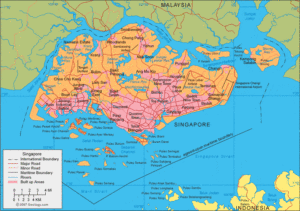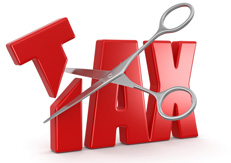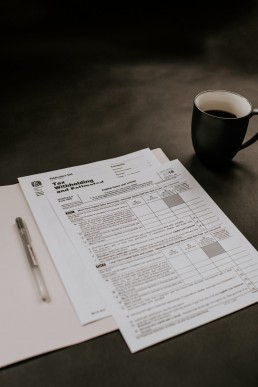How To Start A Food Business (Restaurant) In Singapore
Starting a successful restaurant or food business is many people's dream, especially in a food haven in Singapore. There are many foreigners who love to bring their speciality cuisines into Singapore.
The process in Singapore is not complicated but controls are in place such as certain licenses will be required before your business can operate.
The purpose of this article is to guide you on the steps needed to begin your food business.
1. Incorporating a company in Singapore

Your first step is to set up a private limited company in Singapore through a corporate secretary. You need to specify your primary business activity (SSIC code) for your new company, during the incorporation process. For the food and beverage (F&B) business, you will be selecting from the following:
| 56111 | RESTAURANTS | |||||||||||||
| 56122 | FOOD COURTS, COFFEE SHOPS, AND EATING HOUSES (WITH MAINLY FOOD AND BEVERAGE INCOME) | |||||||||||||
| 56112 | CAFES AND COFFEE HOUSES | |||||||||||||
| 56129 | OTHER FOOD AND BEVERAGE SERVING PREMISES N.E.C. | |||||||||||||
| 56140 | STALLS SELLING COOKED FOOD AND PREPARED DRINKS (INCLUDING STALLS AT FOOD COURTS AND MOBILE FOOD HAWKERS) | |||||||||||||
| 56201 | FOOD CATERERS | |||||||||||||
| 47219 | RETAIL SALE OF FOOD N.E.C. | |||||||||||||
| 47112 | MINI-MARTS, CONVENIENCE STORES AND PROVISION SHOPS | |||||||||||||
| 68104 | LETTING AND OPERATING OF FOOD COURTS, COFFEE SHOPS AND EATING HOUSES (WITH MAINLY RENTAL INCOME) | |||||||||||||
2. Decide On The Place Of Operation

After incorporating the company, the next step is to decide on where to operate your food business. There are many choices such as a hawker stall, in a coffee shop, within a commercial mall or in a stand-alone shopfront such as a shophouse. You can check out more here.
Most landlords will advertise in the major newspapers or via an online property portal.
One caution here is you need to ensure the premise that you are going to rent is allowed to be operated as an F&B outlet. You may need to apply for a change of use permission for the property if the original intended use is not for a restaurant.
In such instances, you should offer the landlord a Letter Of Intent, and state clearly that your offer is subjected to the approval of change of use.
Most commercial leases are signed for a period between 2 to 5 years in Singapore. Besides paying monthly rent, you will need to place a security deposit with the landlord. This security deposit is typically directly correlated with the number of years signed in your tenancy agreement, i.e. 3 years lease = 3 months security deposit.
At the end of the lease, the security deposit will be refunded to you. Any cost required to restore the property back to its original condition will be deducted from the security deposit. You can watch what is a security deposit here.
A rent-free period, which is a common practice here, is that the tenant will request from the landlord a reasonable period of time to renovate the premise before the lease officially begins.
3. Obtaining The Required Licenses To Operate

You need to obtain a food shop license before commencing operation. The total time needed for the application can vary from a week to a few months. If you do not wish to encounter any delays in the license approval, you need to meet the requirements set out below:
- Approval from the relevant land agency e.g. URA and HDB (referred to as planning permission from land agencies)*
- Tenancy agreement#
- Details of the applicant – one of the following (where applicable):
i. Individual – Front and back of NRIC
ii. Company – Information Business Profile purchased from the Accounting & Corporate Regulatory Authority (ACRA)
iii. Society – Certificate of Registration from Registrar of Societies - Basic food hygiene certificate/Refresher food hygiene certificate of food handlers
- Food hygiene officer certificate (for Food caterers, Restaurants, Foodcourts and Canteens only)
- Cleaning program
- The layout of premises (in scaled metric units)
- Letter of authorisation (if the application is not submitted directly by the licensee/director of the company that is holding the licence)
- Pest control contract in respect to the controlling of rodents, cockroaches and flies during the licensing period. The frequency of inspection of the premises in the contract should be at least once a month to detect any signs of pest infestation.
- Supplementary Information form must capture the business name, type of food sold, business operating hours, etc.
- Food Safety Management Plan (critical control points must be identified) or proof of registration for the “WSQ Apply FSMS for Food Service Establishments” course. (For Food Caterers & premises with permission to cater only). For more details, refer to the following link.
- Clear photos showing the exterior and interior of the vehicle used for catering
- Rental agreement or vehicle log card for the vehicle to prove ownership of catering vehicle
- Cleaning program/schedule for catering vehicle
*Do note that this is a potential pitfall for the applicant. The applicant needs to ensure the relevant planning permission has been obtained, before signing any tenancy agreement (TA) and investing in equipment/renovations for the premises.
#Take note that submission of a TA is not needed during the initial stage of application for a licence. The TA will only be necessary at the final stage before the Singapore Food Agency (SFA) approves and issues out the licence to you. You should not sign any TA until the relevant land agency has approved the relevant use for the premises, and you are reasonably confident you can meet the licensing conditions. You should also verify with the owner/landlord on all necessary renovations such as the installation of the exhaust system, pipings for sinks etc.
***
Additional License
If you intend to sell alcohol for your food business, you will need to apply for a Liquor Licence. There are different classes of Liquor Licence. The type of Liquor Licence you need to apply for will depend on
- The type of alcohol being sold (beer, wine, etc)
- The operating hours
- Type of business establishment (restaurant, bar, convenient store, etc)
The licenses are typically valid for 1 year and you can apply for renewal. You can renew your licenses only if you have fulfilled conditions that come with owning a Liquor Licence, such as disallowing any drunkenness, gambling or disorderly conduct within your premise. Selling alcohol without a valid licence or not complying with the conditions is a punishable offence with a fine of up to S$10,000.
***
Being a cosmopolitan city with many different cultures, a significant number of Muslims live in Singapore. If you wish to do their business, you can apply to be a Halal certified establishment.
***
If your restaurant is serving speciality food, most probably you have to import special ingredients from overseas. The Singapore government is very strict about food safety therefore you need to get a license before you can import food ingredients. You can do so by registering with the Singapore Food Agency.
4. Relocation and Hiring Manpower

As a foreigner looking to establish your brand of food in Singapore, most likely that you have to be physically working in Singapore. Applying for an Entrepass will give you the work visa needed to work and live in Singapore.
You will need to employ people to work in your restaurant and we recommend that you consider hiring Singaporeans before you try to employ a foreign worker. In the event you really need to hire a foreigner, their skill level and salary amount will determine if you need to apply for an Employment Pass, S Pass or work permit. For S-Pass and work permit holders, you will be subjected to quotas and levies so it is not so simple and straightforward as you think.
Are you ready to start a food business or restaurant in Singapore? Here at Sg Company Services, we have a team ready to assist you through the entire process to help you to start operating successfully. From the incorporation of your company, sourcing for rental locations, applying for licences, relocation and work passes. Talk to us today!
Download the Telegram app and follow us for the latest updates: https://t.me/sgcompanyservices
Choosing The Best Virtual Office In Singapore For Your Company
The impact of COVID-19 has been tremendous. Companies worldwide have been forced to switch to working-from-mode at short notice. The central business district in Singapore has seen a drastic reduction in office crowd for most of the year 2020, ever since Singapore has gone into the circuit breaker since April 2020. We are currently at phase three and companies have allowed a 50% workforce to return to the office. Thus businesses are turning to virtual office space.
Even so, employers should have come to realise that everyone is capable of working from home by now. Virtual meeting platforms such as Zoom and Skype have seen a surge in take-up rate. In fact, many of our clients have started to explore the possibility of a virtual office to be able to work remotely worldwide and locally. The government has come up with many grants to enable such work arrangements possible.
The New Normal
Rental prices have come down slightly since the beginning of COVID-19 and many virtual and co-working spaces have appeared. They provide a number of services such as a registered business address, a concierge to receive and file your mails, a pantry space and also a dedicated phone answering service.
The following are important criteria to look out for when choosing a virtual office for yourself.
Price
As mentioned, even though rental has come down slightly, Singapore property prices in general are still considered expensive. This is why you should consider a virtual office as compared to a physical space. You can potentially save a lot on costs if you get a virtual office if your operations are small for a start. There are many different vendors out there. Some cheaper packages offer only a mailing address. Any additional services will be chargeable.
Not many virtual offices addresses are located in the downtown area with a prestigious address. You should always check for any hidden costs before engaging one.
Services
Different packages will come with different range of services. Some basic services are mail forwarding, corporate secretarial services, reception services, and so on. Some companies allow individual customers to customise the services that they need. Be sure to check the exact scope of service that they are providing you.
Subscription
Some virtual office providers require a minimum lock-in duration, so please be aware and read through the terms and conditions carefully before signing. So go with a company whom you can trust.
Termination
In the event of termination, there may be some penalties involve. You should know the terms and conditions of the contract to know what are your rights.
Location
Location of your virtual office has a direct connection with regard to the price. Your virtual office location has a direct impact on your company's branding and image to your clients. A central location like Orchard Road or Raffles Place which is accessible to public transport will be most ideal.
Credibility
It is important to engage an established company that 'is here to stay for good'. Some companies may open to much fanfare but eventually cannot stay afloat and goes bankrupt. This will ultimately affect your business reputation and operation.
If possible, you should find out more who are their existing clients and ask to speak to some of their clients. You will get a better sense of what is going on behind the scenes. Another important area to look out for is the state of their environment and facilities.
Quality of Services
The communication skills and language proficiency of the concierge and receptionist are important to your business image. The standard of such services provided is a good indicator of the company’s state and professionalism. The state and maintenance of common area and facilities are also good indicators. The receptionist should be prompt to answer the calls of your clients should you choose to engage one. This will definitely affect the quality of service and image projected to your clients.
High-speed internet and basic printing and scanning of documents facilities must be available at the bare minimum.
Business information security
Some time ago, there was an article on the rising demand for bodyguards trained in cybersecurity. In this digital age, a lot of your business confidential information could be stored in cloud-based programs.
The service provider should have some form of encryption, otherwise, you should be worried. Your business reputation with your clients will be affected if their information is leaked or stolen by hackers. In virtual office service, you should check the terms of the contract on mail handling and forwarding services. They should provide a cyber-secure environment.
The above factors are some factors to think about before engaging a virtual office solution provider. Virtual offices can be the way how businesses will operate in future. It is not only cost-efficient but time-efficient as well. Always find out your needs before engaging one and make sure to customise the package to your needs.
If you need such a service, you can contact us to find out more.
Download the Telegram app and follow us for the latest updates: https://t.me/sgcompanyservices
File Your Corporate Tax via The New Form C-S (Lite)
The Inland Revenue Authority of Singapore (IRAS) has come up with an easier and new e-filing measure from Year of Assessment (YA) 2020, known as Form C-S (Lite). Companies with annual revenue of S$200,000 or less can make use of this simplified income tax return filing. The purpose of introducing this new Form C-S (Lite) is to target small companies with straightforward tax matters, in order to make tax filing easier and faster for them.
In order to qualify for filing Form C-S (Lite), the company needs to meet all of the following criteria:

- The company is incorporated in Singapore
- The company's annual revenue is S$200,000 or below
- The company only derives taxable income at the prevailing corporate tax rate of seventeen per cent (17%)
- The company is not claiming any of the following in the Year of Assessment:
- Group relief
- Investment allowance
- Carry-back of current year capital allowances/losses
- Foreign tax credit and tax deducted at source
Form C-S (Lite) has only six (6) essential fields for you to input. But first, you have to prepare the tax computations for the company, before you proceed to e-file the company's income tax.
For exempt private companies, there is no requirement to submit financial statements and tax computations. But regardless in the event that the Inland Revenue Authority of Singapore (IRAS) requests for the financial statements, you need to have them ready, otherwise, you may be liable for an offence.
From YA 2020, companies that qualify will be required to e-File Form C-S (Lite) by the 15th December 2020.
If you need any assistance with your company's tax computation for YA 2020, please do not hesitate to get in touch with us for a quote.
You can check out more articles on corporate tax matters here.
Download the Telegram app and follow us for the latest updates: https://t.me/sgcompanyservices
Tax Deductible Expenses For Your Singapore Company
In the course of running the business, there are certain tax-deductible expenses incurred that you can offset against your company’s taxable income.
Of course, having said that, not all business expenses are tax-deductible. It is essential that you or whoever is in charge of the preparation of the company’s tax returns are aware of what expenses can be eligible.
All 4 conditions listed below must be fulfilled for expenses to be eligible for tax deductions:
- Expenses incurred in the process of income-producing activities.
- The expenses must have already been incurred, meaning the expenses cannot be some form of future projection.
- Expenses are not capital in nature, but revenue in nature.
- Under the Income Tax Act, the expenses are not prohibited from deduction.
We have a list here of examples of what exactly is a deductible or non-deductible expense.
Deductible Expenses:
- Accounting fee
- Administrative expenses
- Advertisement
- Auditor’s remuneration
- Bad debts (trade debtors)
- Bank charges
- Commissions
- Salary
- Director’s fees
- Director's remuneration
- Exhibition expenses
- Office upkeep
- Periodicals & newspapers
- Postage
- Printing and stationery
- Property tax
- Rental of a business premise
- Registration of patents and trademarks
- Research and development
- Retrenchment payments where the business still continue to operate
- Secretarial fees
- Staff remunerations (salary, bonus, and allowances)
- Telephone and internet bills
- Transportation
- Utilities
Non-Deductible Expenses
- Amortisation
- Bad debts (non-trade debtors)
- Country club fees
- Personal vehicle expenses
- Depreciation (you can claim capital allowances instead)
- Dividend payments made on preference shares
- Donations
- Exchange loss (non-trade or capital in nature)
- Fines
- Fixed assets acquisition cost (you can claim capital allowances instead)
- Goodwill payment
- Installation of fixed assets
- Penalties
- Renovation or refurbishment works
- Retrenchment payments where the business has ceased operating completely
This list is non-exhaustive but rather give you a guide on what type of expenses are eligible for tax deductions.
In general, personal expenses that are not related to the business such as your daily meal expenses, and fixed assets purchase expenses are all non-deductible for tax purposes.
If you require assistance in your corporate tax filing, please do not hesitate to get in touch with us today!
Download the Telegram app and follow us for the latest updates: https://t.me/sgcompanyservices
How To Reduce Corporate Tax Bills With These Tax Reliefs
The corporate tax filing deadline is around the corner. The deadline for filing your corporate tax is by 15th December 2020. Do you know that there are some tax reliefs that you can make use of to reduce the tax payable? Here are some of them.
Tax Exemption Scheme For New Companies

If you have just incorporated a new company, your company is eligible for tax reliefs for the first three consecutive years of assessments (YA) where the YA falls in:
Year of Assessment 2020 onwards
- For the first $100,000 of normal chargeable income will get a seventy-five per cent (75%) exemption; and
- The next $100,000 of normal chargeable income will have a further fifty per cent (50%) exemption.
Year of Assessment 2019 and earlier
- The first $100,000 of normal chargeable income will be a full exemption; and
- The next $200,000 of normal chargeable income will get a further fifty per cent (50%) exemption.
Your company must meet the below criteria in order to qualify for tax reliefs:
- incorporated in Singapore;
- a tax resident in Singapore for that particular Year of Assessment;
- throughout the basis period for that Year of Assessment, no more than twenty (20) shareholders beneficially held the total share capital directly where
- all shareholders are individuals or;
- at least one shareholder is an individual, holds at least ten per cent (10%) of the issued ordinary shares
However, if your company's principal activity is investment holding or undertaking property developments for either sale or investments, or both, the above tax relief will not be eligible for these companies.
Partial Tax Exemption For Companies

Companies that qualify can enjoy the following tax relief:
Year of Assessment 2020 onwards
- The first $10,000 of normal chargeable income will get a seventy-five per cent (75%) exemption; and
- The next $190,000 of normal chargeable income will enjoy a further fifty per cent (50%) exemption.
Year of Assessment 2019 and earlier
- The first $10,000 of normal chargeable income gets a seventy-five per cent (75%) exemption; and
- The next $290,000 of normal chargeable income gets a further fifty per cent (50%) exemption.
Companies will not be eligible for this partial tax exemption relief if they have already claimed the tax exemption scheme for new companies. Take note that all companies, inclusive of companies limited by guarantee, is eligible for partial tax exemption.
Deduction Of Expenses Incurred Before Commencing Business

One (1) year prior to the first day of its financial year when the company made its business receipt of the first dollar, all the expenses incurred from those business or revenue-generating operations are tax-deductible. The reason for this is simply to assist businesses when they are just starting out. Companies that are subject to tax in accordance with Section 10E of the Income Tax Act will not be eligible.
The Singapore Government and Economic Development Board are constantly promoting a pro-business environment to attract more investments into Singapore to create more opportunities.
If you are unsure what tax reliefs you can be eligible for, do contact your filing agent or accounting professional.
Download the Telegram app and follow us for the latest updates: https://t.me/sgcompanyservices
Do I have to file corporate tax for YA 2020?
December is usually the time to file corporate tax for business owners. The filing deadline for corporate tax is the 15th of December 2020 for the Year of Assessment 2020 (YA2020). Hard copy filing is no longer available, thus all corporate taxes have to be e-filed. There may be some confusion among us about corporate tax filing and personal income tax filing. Corporate tax filing occurs at the end of the year while personal income tax filing happens in April annually.
Take note of your financial year-end

Companies that have their financial year-end (FYE) in 2019, will need to file corporate tax for YA 2020.
If a company's financial year period is 1st July 2018 to 30th June 2019, it needs to file its corporate tax for the same period, for YA 2020 by 15th December 2020.
A different example would be, if a company's financial year period is 1st April 2019 to 31st March 2020, it will not need to file its corporate tax for the same period as the closure of its financial year did not happen in 2019. However, the company will need to file corporate tax for this same period, for the Year of Assessment 2021.
For companies with their Unique Entity Number beginning with 2019, they do not need to file corporate taxes for the YA 2020.
However, there are some exceptions you need to take note of.
For example, if the company's incorporation date is in 2019 but its financial year-end (FYE) is in 2019, it is necessary to file corporate taxes for YA 2020. A newly incorporated company in 2019 may choose to have its first financial year shorter than 365 days.
As a guide, if your FYE is within the calendar year of 2019, you need to file your corporate tax for YA 2020 by 15 December 2020. You can be penalised if you fail to do so.
If you are still unsure about your obligations for corporate tax filing, you may contact a registered ACRA filing agent.
Download the Telegram app and follow us for the latest updates: https://t.me/sgcompanyservices






